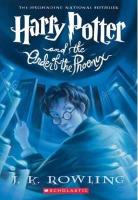
Harry Potter and the Order of the Phoenix is the longest book in the series, and with good reason—Harry’s fifth year at Hogwarts is filled with emotional turmoil, political tension, and the rising threat of Voldemort. Isolated and frustrated after the Ministry of Magic’s refusal to believe in Voldemort’s return, Harry struggles with anger and confusion, especially as Dumbledore keeps him in the dark. The introduction of Dolores Umbridge, one of the most detestable characters in the series, adds a new layer of conflict, as she takes control of Hogwarts and enforces oppressive rules. Harry, in rebellion, forms Dumbledore’s Army to teach students how to defend themselves, marking his growth as a leader.
I’d give this book a four out of five because, while it’s packed with powerful moments and essential character development, the pacing can feel slow at times. Harry’s internal struggles are a focal point, as he grapples with his emotions, his connection to Voldemort, and the weight of the prophecy that looms over him. The book explores themes of authority and resistance, as the Ministry’s refusal to accept the truth mirrors real-world political dynamics, adding a layer of complexity to the narrative. The relationships between the characters, particularly Harry’s bond with Sirius, are deeply explored, making Sirius’s eventual death all the more heartbreaking.
What makes The Order of the Phoenix so compelling is how it shows Harry’s transition from a boy to a young man burdened with responsibility. His frustrations, his isolation, and his grief are raw and real, giving readers a deeper insight into his character. The final battle at the Ministry is a high-stakes, action-packed sequence, but it’s the emotional weight of the loss and the revelation of the prophecy that leaves a lasting impact. This book sets the stage for the final battle, with Harry now fully aware of his role in the fight against Voldemort, but also burdened by the knowledge of what it will cost him.
